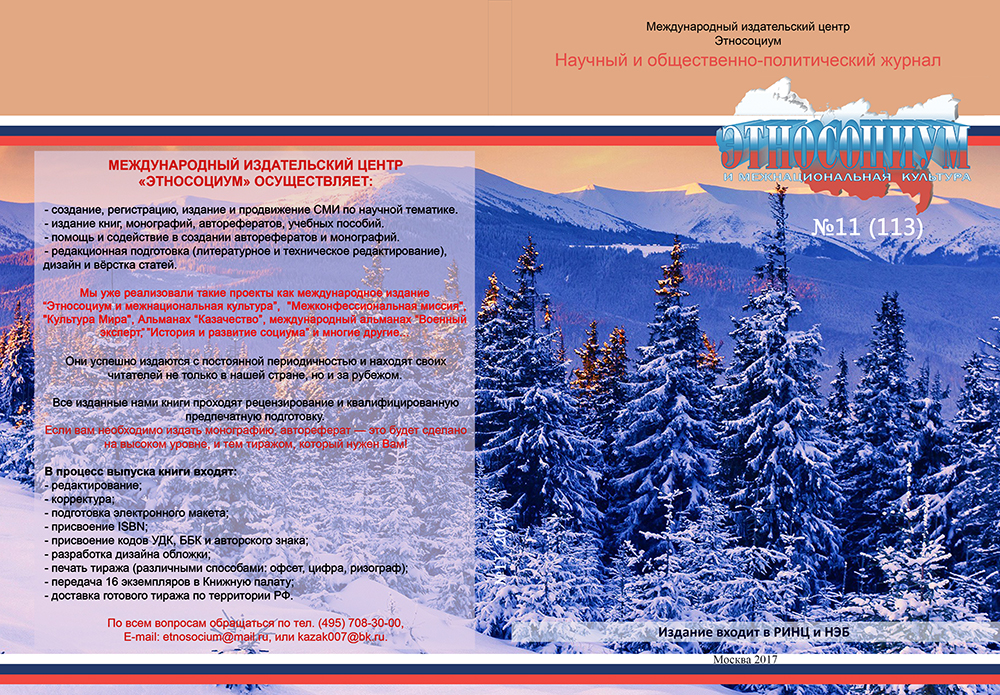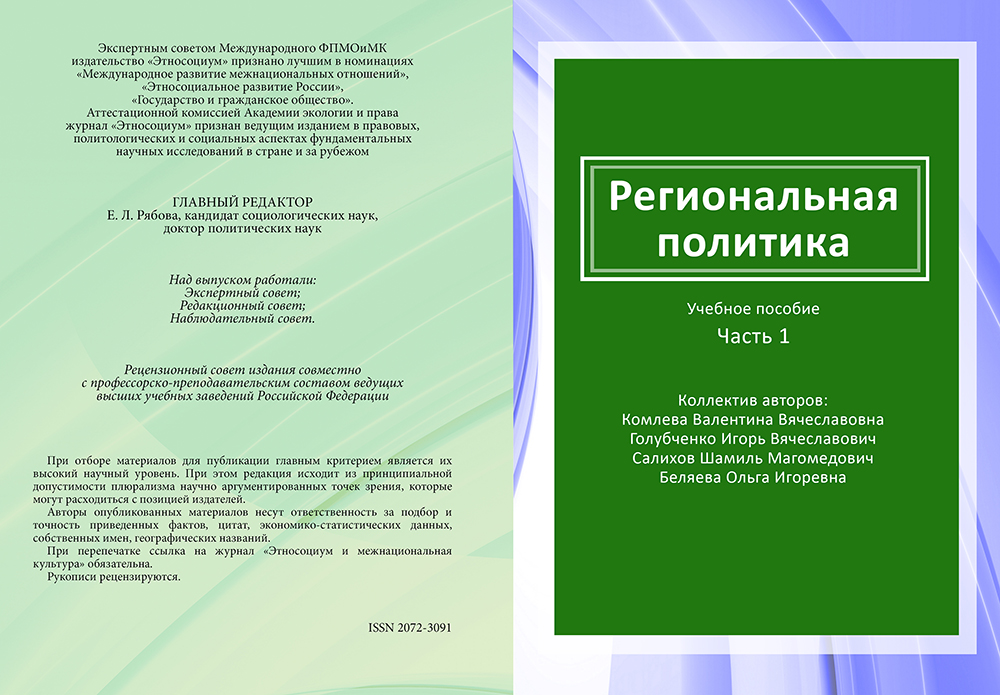

Content
|
COUNCIL OF INTERNATIONAL RELATIONSHIP
|
|
|
Editorial Note
|
9
|
|
President's Award for contribution to strengthening the unity of the Russian nation
|
11
|
|
Kondrashihin A.B. Financial incentiveness of youth scientific creativity: Sevastopol experience
|
14
|
|
Nesterchuk O.A., Romanova D.Y. Freedom of conscience and religion as a problematic field of religious and political processes
|
21
|
|
POLITICS, ECONOMICS, LAW:
ACTUAL PROBLEMS OF MODERN SOCIETY
|
|
|
Boltenkova L.F. What is the first Slavic tribe called themselves Rus and what follows from this?
|
30
|
|
Ryabova E.I. The territory of Russian principalities and the modern significance of this issue
|
42
|
|
Dolgenko A.N., Murashko S.F., Rudakova S.V. Mediatext as a result of textual activity in Russian and foreign languages in a non-linguistic educational institution of higher education
|
52
|
|
Prytkova Y.I. Implementation of the state program on rendering assistance to voluntary resettlement to Russian Federation of compatriots living abroad and its results on the example of Lipetsk region
|
56
|
|
Shemyakina O.D. The peasant cultural tradition in Russia (experience of studying)
|
68
|
|
Fotina L.V., Norkin K.B. Metrics in the project management of state development
|
80
|
|
Koryagina E.D. Self-government in the higher education
|
90
|
|
POLITICS, ECONOMICS, LAW:
REGIONAL STUDY
|
|
|
Shakhov S.K. Russian education on the path of reform
|
105
|
|
Kulyabceva V.N., Semenova A.N., Kazieva M.H., Uzdenova B.H. The role of information and communication technologies in modern conditions of civil society development
|
118
|
|
Bayrakovskaya T.R. Modern trends in the development of gender space in the republics of the North Caucasus. Comparative analysis
|
123
|
|
Yurchenko I.V., Dontsova M.V., Yurchenko V.M., Yurchenko N.N. Conflictological characteristics of the ethnopolitical situation in the Krasnodar Territory and the Adygea Republic
|
131
|
|
INTERNATIONAL RELATIONSHIPS:
POLITICS, ECONOMICS, LAW
|
|
|
Cherevko K.E. The Decree on Peace and Colonial and Clandestine Treaties: the Treaty on the Assignment of Colonies to the United States of America in Russian America in 1867 and Its Legal Invalidity
|
156
|
|
Shahgaldiyev Eldar Azerbaijan: Higher education and students’ migration
|
164
|
|
Babain A.V. Uncertainty of the border areas of the Republic of Tajikistan as a factor of radicalization of the population
|
174
|
|
Voznesenckiy I.S. Student club: the experience of organizing a time management club
|
184
|
|
Ternovaya L.O. From kosmopoetical dreams to geokosmopolitical projects
|
193
|
|
REVIEW
|
|
|
Vrajnova M.N. Secrets of personal management. Review of the monograph I.S. Voznesensky “The Way to Personal Effectiveness”
|
202
|
|
Abstracts
|
205
|
|
Authors
|
215
|
|
Requirements to materials submitted to the international publishing house "Etnosocium"
|
217
|
The problems of organization of scientific research of schoolchildren and students with technologies of activation and stimulation of creative projects are considered. As a modern mechanism, the financial leverage is considered, in particular, the properties of budgetary support of scientific organizations and universities. Recommendations are given to improve the financial mechanism to stimulate and revitalize the creative work of the city's youth.
Keywords: etnosotsium, educational organization, higher education institution, the budget places, scientific development, small academy of sciences.
This article provides an analysis of the issues - the importance of freedom of conscience and religion in the context of religious and political processes in Russia. Discusses different understandings and political basis of the right of freedom of conscience and religion in the modern world. Noted compliance and lack of implementation of the rights to freedom of conscience and religion with taking into account the religious factor in the political process.
Keywords: The right to freedom of conscience and religion, religious factors, religion and politics.
On the basis of the analysis of numerous historical studies, the author states that the first Slavic tribe, called Rus, were glades (Kyivans), occupying not the vast territory of the established Old Russian state. The current Kyiv political elite denies its Russianness, and therefore, according to the author, loses the right of historical succession. On the Russian land there must also exist a corresponding statehood.
Keywords: glade, Kyivites, Kiev political elite, Russian land, Old Russian princedoms, "one Family", branches of the Russian people.
The author, relying on numerous sources, shows the process of the historical formation of the Russian lands that make up the present "Ukraine". He draws a conclusion: denying Russianness, the Ukrainian political elite 2014-2017. deprives himself of the right to build statehood on this territory.
Keywords: Russia, Russianness, "Russian land", "Ukraine", the Ukrainian political elite.
The article considers media text as a result of textual activity in Russian and foreign languages in a non-linguistic educational institution of higher education. The authors proposed the concept of "linguistic-psychopsychological abilities". These abilities can serve as a basis for building situationally (contextually) adequate media texts that provide relevant communication.
Keywords: media text, text activity, linguistic-sociopsychological abilities, relevant communication, media education; media literacy.
In the article the author analyzes the results of the State program on assisting the voluntary resettlement in Russia of compatriots living abroad, issues the first positive results of the Program: attracting qualified staff to ensure a dynamic development of economy and social sphere; implementation of investment projects, staffing companies of Federal and regional special economic zones. Also the author specifies some disadvantages of the Program: the incompleteness of the process of regulatory support, the lack of provided by the State program, offices of the Federal Migration Policy of Russia in the States-participants CIS, and also in other states, the lack of the presentation of the overseas entities of the Russian Federation some regional programs of resettlement, financial difficulties of immigrants, especially in the initial phase, the lack of additional incentives for employment of compatriots for the employers. However, the author concludes that the State program of resettlement of compatriots’s demanded and for its successful implementation it’s essential that the project must be supported at the Federal and regional levels.
Keywords: resettlement of compatriots, the issues of employment, citizenship, migration policy, migration growth.
The article is devoted to the patriotic peasant cultural tradition of the 20th century and experience study in historiography.
Keywords: Peasants, old believers, Slavophiles.
The article examines student self-government, its importance for the formation of successful specialists, the quality of this social group, important for the formation of its successful future and favorable future of the country. Self-government is important for the establishment of civil society institutions. The main problems of the development of student government and the experience of its support in Germany and Russia are given.
Keywords: civil society, self management, higher education, an experience, support for development.
Modern society is assessed as an information society. The introduction of information technologies contributes to the formation and development of a new system of information and communication in it. The main place is given to the introduction of information technologies in the processes of public administration, which allowed to expand the rights of citizens to receive public services and increase their opportunities in the political decision-making process.
Keywords: information technology, information, society.
In the article the main problems of "gender", first of all, equality of man and women in various spheres of social activity are analyzed on the example of the republics of the North Caucasus.
Keywords: the Constitution of the Russian Federation, gender equality, discrimination, women's emancipation.
The relevance of this study is due to the need for comprehensive study of conflict factors in the development of the ethnopolitical situation in strategically important regions of the South of Russia.
The purpose of this article is to present a conflictological description of the ethnopolitical situation in the Krasnodar Territory and the Republic of Adygea, to study the development trends of the regional ethnopolitical situation in the conditions of the new electoral cycle.
Methods of research: The factual material is based on the results of sociological research conducted in 2015-2016. Institute of Social, Economic and Humanitarian Studies of the Southern Scientific Center of the Russian Academy of Sciences using the methods of content analysis of regional information portals (228 sources), a questionnaire (n = 450, 2015 and n = 330, 2016), an expert survey (n = 18, 2016). Based on the results of empirical studies, statistics and qualitative characteristics of conflicts with the ethnic component are presented, their causes are analyzed, and data on the dynamics and forecast of the development of the situation for the next three years are presented.
Significance of the study: The study showed that the enopolitical tension in the regions under study currently tends to become more complicated under the influence of the economic crisis and the beginning of a new electoral cycle, but open interethnic confrontations are not expected.
Keywords: ethnopolitical situation, conflict, Krasnodar Region, Republic of Adygea.
Students’ migration has become one of the essential parts of the state policy; that is why states are more and more focusing on the trends and developments of students’ migration flow. Without doubt, the prospective students’ insight profiles have also undergone to some changes, especially those who are interested in studying abroad using data from ongoing researches. There are also some other factors which influence motivating their interest to study abroad.
Another major trend in students’ migration flow is related to changing function of Azerbaijanian HEIs’ status from sending institution into the hosting organizations. Such kind of development provides insight into the wide range of information sources used in the decision-making process. A valuable resource, that allows higher education institutions and suppliers to plan informed and more effective recruitment and marketing strategies.
This article shows some basic statistical trends in the development of migrant students in CIS and other European countries.
Keyword: students’ migration, statistics of students’ in and out movement, legal migration, academic reserach on migration.
The article is devoted to the problem of tajik-kyrgyz and tajik-uzbek border sections delimitation and related issues. Analyses conflict situations emerging in border areas and enclaves, as well as trends to aggravate such situations in future. Current tension considers as precondition for society radicalization (including religious radiicalization).
Keywords: Central Asia, Tajikistan, Kyrgyzstan, Uzbekistan, enclaves, border.
Student clubs have existed for a long time. The directions of their work are constantly expanding. With the advent of time management technologies, there was a need to distribute them among student youth. The first in Russia student club time management was a club in MADI, acting with the assistance of the League "Time". The organization of meetings revealed not only the need for students to learn how to manage their own time, but also to master the skills of achieving goals.
Keywords: time, time management, students, club, League "Vremya".
Six decades after the launch of the first artificial satellite of the Earth appeared grandiose geokosmopolitical projects. Even their proposal and not a possible implementation have resulted kosmopoetical dreams, which featured representatives from various directions of cosmism at the beginning of the last century. At the present stage of world development this poetic potential allows us to estimate the true meaning of the geopolitical ideas mass space exploration.
Keywords: Space, cosmism, biokosmists, anarchists, globalization.
The modern man's need for self-organization, and with it also in manuals to improve the effectiveness of personal management, is dictated by the complication of almost all aspects of life, a catastrophic lack of time for the most necessary and interesting. The monograph under review reveals the features of achieving personal effectiveness based on time management technologies.
Keywords: self-organization, time management, personal management, personal effectiveness.